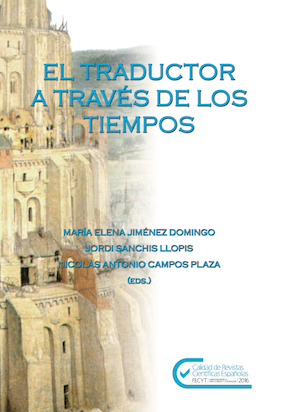"Al mensajero matara". The mediator impersonates the author and three biblical texts
DOI:
https://doi.org/10.7203/qfilologia.21.9312 Abstract
Abstract
The tendency of the translator to participate in the transmission of his original is an ancient one and, from Republican Rome until, at least, the agony of the Ancien Régime, perfectly adapted to the established cultural model ,since translation was centered upon the transmission of literary culture according to the principles of cultural appropriation as a subject of natural law. Translation was seen as as transubstantiation, as reformulation, as artistic and/ or rhetorical emulation. With Romanticism, this tendency to co-authorship was substantially checked, though not abolished. In the positive pole, the linguistic, referential and cultural nature of translation proper makes a certain degree of intervention unavoidable, regardless of text-type, through increasingly less so from the persuasive to the informative texts. In the negative pole, we have to single out the translators imbued with a mission: the apparatchiki who inoculate while they intubate via the cultural catheter of translation.
This historical and methodological introduction will be complemented by the exposition, analysis and discussion of the versions of three extracts from the most translated and retranslated book in the world: the Bible. From the point of view of text-typology, we have three: ‘informative’ (the Prologue to Saint John’s Gospel), ‘expressive’ (The Song of Songs) and ‘persuasive’ or, as Nida would have it, ‘imperative’ (The Lord’s Prayer). We basically rely upon the Latin Vulgate as the source text and several Western European languages, at different historical periods, as target texts.
Keywords: history of translation; translationmethodology; cultural translation; substitution; co-authorship.
 Downloads
Downloads
Downloads
Published
How to Cite
-
Abstract434
-
PDF (Español)530
Issue
Section
License
 Este obra está bajo una licencia de Creative Commons Reconocimiento-NoComercial-SinObraDerivada 4.0 Internacional.
Este obra está bajo una licencia de Creative Commons Reconocimiento-NoComercial-SinObraDerivada 4.0 Internacional.
Authors who publish with this journal agree to the following terms:
- Authors retain copyright and grant the journal right of first publication with the work simultaneously licensed under a Creative Commons Attribution License that allows others to share the work with an acknowledgement of the work's authorship and initial publication in this journal.
- Authors are able to enter into separate, additional contractual arrangements for the non-exclusive distribution of the journal's published version of the work (e.g., post it to an institutional repository or publish it in a book), with an acknowledgement of its initial publication in this journal.
- Authors are permitted and encouraged to post their work online (e.g., in institutional repositories or on their website) prior to and during the submission process, as it can lead to productive exchanges, as well as earlier and greater citation of published work (See The Effect of Open Access).




